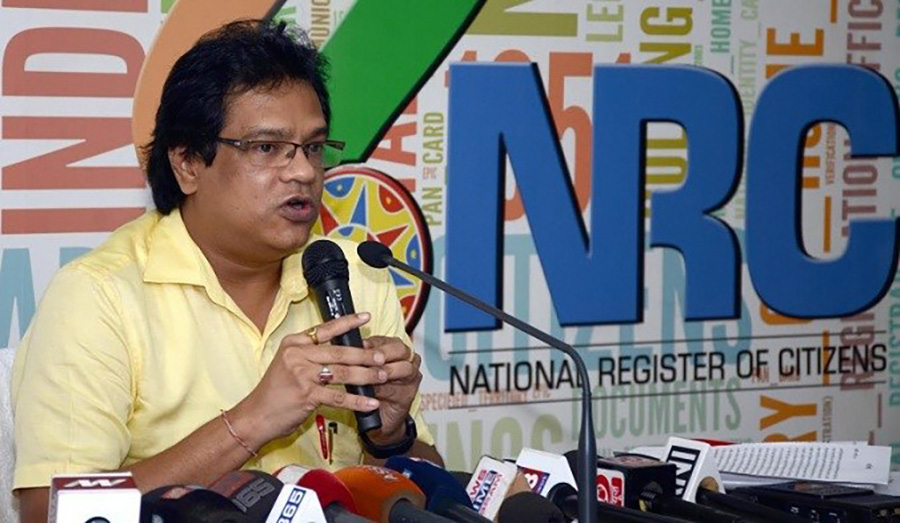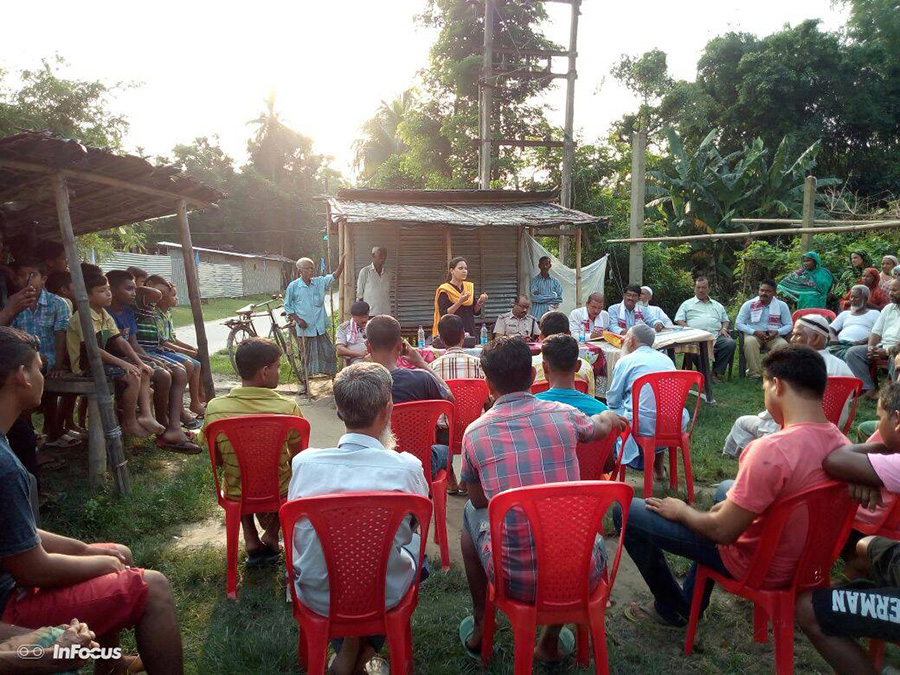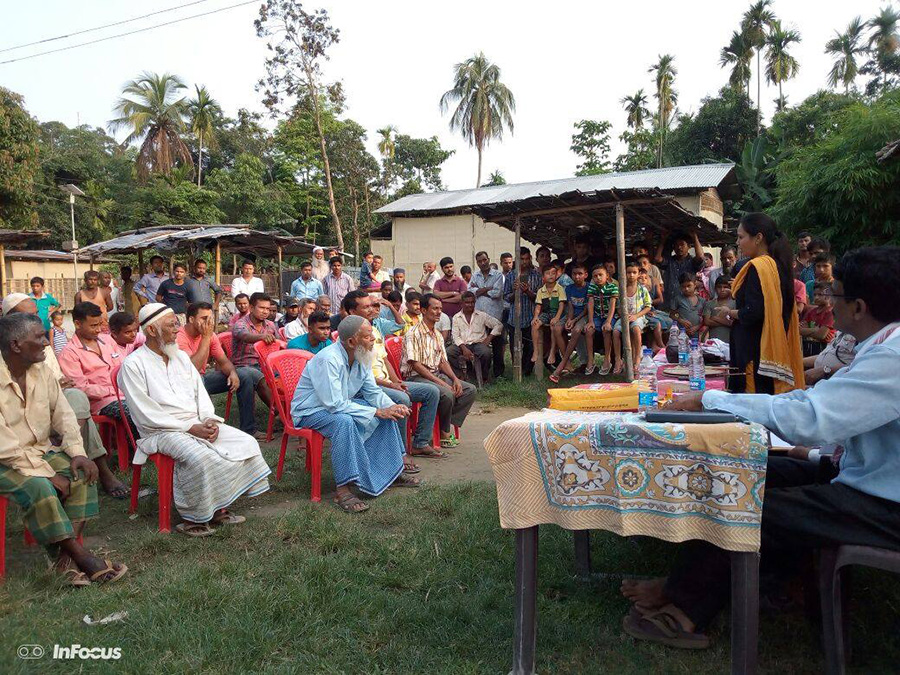It has taken more than three decades since the end of the Assam agitation for this state in India’s northeastern frontier to finally have a complete register of citizens, a dream and a demand of many local denizens. The National Register of Citizens (NRC), a draft list to be published on July 30, is expected to contain names of genuine Indian citizens residing in Assam and, in the process, find a solution to the problematic citizenship issue in Assam that has plunged the state into various phases of violent social unrest since the 60s and the 70s.
The process has been undoubtedly hailed by many, particularly the Assamese speaking populace, as a panacea for Assam that will free it from illegal infiltrators. But it has also invited serve criticism and insults from various organizations, individuals and intellectuals that have expressed fear that the process will render a number of people stateless. The latest to hit the headlines is a social media campaign accompanied by the caption “India stop deleting Muslims,” linking the process of verification of citizenship in Assam to the exodus of the Rohingya in Myanmar.
The campaign was initiated by Avaaz, a US-based social media platform that was launched in January 2007 that claims to promote global activism on issues such as climate change, human rights, animal rights, corruption, poverty, and conflict. Its statement reads: “India will delete as many as 7 million Muslims in Assam State from its master list of “citizens” because they speak the wrong language and worship the wrong God.” It goes on to claim “this is how genocide begins-how the nightmare of the Rohingya began,” and that a similar situation is “unfolding quietly,” in Assam that calls for “raising a massive alarm and calling for the UN Secretary General and “key governments” to “intervene.”
However, to say that the process was “deleting out Bengali Muslims” and to use the analogy of the Rohingya crisis was strange to say the least, given the fact that those that have been affected by the process includes people from all religions, predominantly Bengali Hindus and Muslims. In fact, it has become an everyday story now of people who claim to be genuine citizens in the Barak valley, Barpeta, Nalbari, Goalpara, Kokrajhar and other districts of Assam, but have had their applications for verification rejected.
The NRC office in Guwahati has launched a counter campaign under the hashtag (#Stop_Fake_Propaganda_Against_NRC_Assam) on its official Twitter handle NRCAssam. In comparison to the Avaaz campaign, which has almost 800,000 signatories, the NRC’s counter campaign has managed to garner near about 3,000 signatures to date. But more than finding the winners and losers in this social media battle, what perhaps is of great significance is that the masses in Assam have refused to be distracted by social media or allow it to cause civil unrest.
After all, the NRC, however controversial it may be, is part of both an emotive and an extremely complex issue that is meshed in various shades of grey when it comes to identifying genuine citizens, based on historical facts, demarcation of boundaries and post-partition India and the creation of Bangladesh in 1971. It is a process that is perhaps inalienable to the history of the state and its people and it does, at least in principle, promise to find a solution to the issue of illegal migration of people from across Bangladesh. Assam shares a 284km border with Bangladesh of which about 224km is fenced. There is also a 60km porous stretch that is mostly riverine.
Why Use the NRC in Assam: The Background
The objective behind updating and publishing the 1951 NRC is to compile a list of the names of genuine Indian citizens residing in Assam and, in the process, detect foreigners – mostly Bangladeshis – who may have illegally entered the state after March 24, 1971. Citizenship has always been a thorny issue in Assam, plunging it into several phases of the anti-foreigner’s movement since the early 60s and culminating in the Assam agitation in 1979 led by the All Assam Students Union (ASSU). The anti-foreigner’s movement reached its crescendo with the massacre of 2,191 Bengali Muslims, mostly women and children in Nellie in Assam, Nagaon district in February 1983, and ended with the signing of the tripartite Assam Accord in 1985 with the then Prime Minister of India Rajiv Gandhi, the Assam State government and the ASSU leaders. March 24, 1971, was set as the “cut-off date” after which anyone entering Assam from Bangladesh would be identified as a foreigner.
Publication of the NRC has been long overdue. The process is certainly important, as it has been a long-standing demand of the Assamese people to detect and deport illegal Bangladeshi migrants from their state. The massive exercise aimed at identifying illegal immigrants in the state follows a decision in 2005 after a series of meetings between the central, state government and the AASU.
However, various governments that ruled Assam were reluctant to update the NRC of 1951 either owing to various political considerations or perhaps fear that it would lead to a breakdown of law and order in the state. The apex court of India – the Supreme Court – stepped in and responded encouragingly to petitions that were brought before it, including those that asked for the deletion of illegal voters from the voters’ list of Assam and sought an update of the NRC, and ordered the Indian government to begin the process of updating the NRC in Assam. Accordingly, the Ministry of Home Affairs issued a notification for starting the work of updating the NRC on January 28, 2014. An Indian Administrative Service (IAS) bureaucrat Prateek Hajela, was appointed as the coordinator.

The NRC Updating Process to Date
An important milestone was reached on December 31, 2017, when the first draft of the NRC with names of 1.9 crore or 10.9 million (of the 3.29 crore or 30.29 million people that applied) was published. Those that were included were mostly added on the basis of legacy documents (the NRC of 1951 and the Electoral Roll of 1971 through midnight of March 24, 1971, are together called Legacy Data. Persons whose names appear in these documents and their descendants are certified as Indian citizens). After the publication of the second draft on July 30, a final list is expected to be published by December 2018 after the disposal of all claims and objections in final registers at various levels
On July 5, NRC coordinator Hajela said that names of around 1.5 lakh or 150,000 people featured in the first draft of the NRC would not be included in the final draft to be published on July 30, as discrepancies were found during the verification process. Also, after the publication of its first draft on December 31 last year, the names of 65,694 persons featured in it were found to be inadmissible during the family tree verification process. A family tree verification process is a two-part system (manual and computerized) of checking the legacy data of applicants
The NRC coordinator also stated that the names of another 19,783 persons were included by mistake, adding that more such cases might come up during the final quality control checks. The names of 48,456 married women, who had provided certificates from panchayats (village councils) to prove their citizenship, were also found to be inadmissible.
The Campaign Against the NRC
The online campaign against the NRC on Avaaz has gone viral. Thousands of people from across the world signed the petition minutes after it was shared on Twitter and Facebook on July 12. “We urge you to issue an early warning about the publication of the NRC in Assam state in India – which will lead to mass violence, ethnic cleansing and the transfer of minority Muslims to prison camps for life. As global citizens, we ask the UN and other concerned governments to work with India and Bangladesh to ensure there is scrutiny over the NRC process, that it complies with human rights standards and that no one is left stateless,” the statement said in its message to the “UN Secretary General and the whole International Community.”
The campaign also carried NRC coordinator Hajela’s picture along with the statement: “One bureaucrat in India currently holds the fate of millions in his hands! Prateek Hajela is responsible for the list of “citizens” and he’s carrying on the work of a dangerous state machinery, that’s destroying lives.”

The NRC Coordinator’s Counterpoint
The NRC coordinator took the challenge head-on. He told this writer that he is “not much worried about who’s saying what in this world regarding the NRC.” “We are concerned with our own laws, so the NRC is fine. But because of, this my state and my country should not be slandered across the world. People should not defame me. We are not a banana republic where anyone can get away with saying that we are carrying out illegal acts. It’s a constitutional process with all of the safeguards for everyone and it cuts across religions,” Hajela asserted.
He seemed certain that the online campaigns against the NRC were aimed at creating a law and order situation and inciting communal passions, as “the very use of the word Rohingya and genocide is an indication of that.” In his opinion, he is only “carrying out a task,” which the Supreme Court of India has assigned him to do. He dismisses the campaign against the process by Avvaz and other groups like “Newsclick,” “SabrangIndia” and a civil society initiated “fact-finding report” under the banner of “United Against Hate,” as “absolutely absurd statements.”
“Some of these groups have come out with a fact-finding report without any facts. They interviewed me and my officer but chose not to write about what we told them,” Hajela claimed.
The 12-member United Against Hate fact-finding team, which visited Assam recently to assess the NRC update, released its findings on July 14, questioning the procedure of citizenship enumeration, categorically stating that “injustices (are being) meted out to Bangla-speaking Muslims and Hindus on the basis of language and religion” and if not checked and stopped on time, “a volcano can erupt” in the state. However, this claim has been dismissed by many Guwahati-based intellectuals and activists.
The fact-finding mission’s claim that suicide rates have increased owing to the NRC with people taking their lives for fear of being left off of the citizen’s register had Hajela asking, “How many suicides have happened earlier and how many now? Do they have the data? How can you make such a sweeping statement?”
Ground Zero
However, it is not that there are no problems. There are almost daily reports in the news of people that are either being made to run from pillar to post to get “more documents,” many from poor families in which the daily wage earner then has to run all over. Others end up in detention centers (jails) after being marked “doubtful voters” (D-voters) – flawed confinements of people and many others left at the mercy of the Assam border police to prove their identity as Indian citizens.
Not a day goes by without reading stories of suffering of those that are marked D-voters, running around with a bag full of documents (16 documents are needed to prove one’s nationality claim), doing the rounds of the Foreigners Tribunal and the one-judge bench of the Gauhati High Court with an appeal after spending all of their hard-earned income. The story of the inhumane detention (since March 31) of the 102-year-old Chandradhar Das, a resident of Borai Basti in the Silchar jail in Assam’s Cachar’s district, is a sad reminder of the cases that violate human dignity and rights.
Many organizations both in the Bhramaputra and the Barak valley of Assam – The Citizens Rights Protection Coordination Committee, an umbrella organization of 43 different groups in south Assam’s Barak Valley, the All Cachar Karimganj Hailakandi Students Association, the All BTAD Minority Students Union (ABMSU) and the All Koch-Rajbongshi Students’ Union (Pradip Ray faction), to name a few – have risen in protest and said “harassment in the name of illegal migrants is not acceptable.”
Notably, a special monitor for minorities and communal violence of the National Human Rights Commission (NHRC), Harsh Mander, recently resigned after claiming that the commission’s refusal to act on his report on the status of the people declared as foreigners in the detention centers in Assam was one of the reasons. A former IAS officer, Mander was assigned by the NHRC to visit the detention centers in Assam.
Such has been the intensity of the problems in many parts of the state that the main opposition party in the state and the country—the Congress party—has decided to move the Supreme Court against what it called “bias in the NRC process.” The Assam Pradesh Congress Committee President Ripun Bora on July 19 also urged Union home affairs minister Rajnath Singh to intervene in the NRC updating process. In a letter to Singh, he alleged that the NRC Authority was “acting in a partisan manner” to drop the names of thousands of Indian citizens from the draft NRC.
Bora, who is also a member of the Upper House in the Indian Parliament, claimed that merely on the basis of “misleading police complaints” filed by some local residents against laborers from a minority community that move around the state for work, “the NRC state coordinator has forwarded all cases registered in different police stations against these Indian citizens to the verification officers of the concerned NRC Seva Kendra (a local government office) with instruction to delete these names from the draft list without any verification of their records.”
In his letter to the Indian home affairs minister, Bora also claimed that apart from keeping on hold the names of 1.25 lakh D-Voters and their descendants, the names of approximately 90,000 declared foreigners and their descendants would not appear in the draft NRC to be published by July 30. In his words, “there is panic on this issue everywhere in Assam and if names of several lakhs of genuine Indian citizens are left out, it will not only be an injustice but abuse of Constitutional powers.”
Response from India’s Home Affairs Minister
The Indian home affairs minister responded with a series of tweets last Sunday. He said, “There is no reason for panic or fear. No person will be allowed to be harassed. We will ensure that every individual gets justice and is treated in a humane manner,” while assuring that the NRC exercise is being carried out in a totally impartial, transparent and meticulous manner and will continue to be so.
His statements read: All individuals will have sufficient opportunity for all remedies available under the law. At every stage of the process, adequate opportunity is given to all persons to be heard. Government wants to make it clear that the NRC, to be published on July 30, is only a draft and after draft publication, adequate opportunity for claims and objections will be available. All claims and objections will be duly examined. Only thereafter, final NRC will be published. The ‘Citizenship Rules’ provide that any person who is not satisfied with the outcome of claims and objections can appeal in the Foreigner’s Tribunal. Thus, there is no question of anyone being put in a detention centre after the publication of NRC.
NRC coordinator Hajela, however, smashed the Assam Congress party leader’s claims of bias, calling it “absolutely irresponsible” and “a lie.” He wonders if they have realized the issue of omitting some applicants, which was taken up for hearing in the Supreme Court on July 2, only now. “If they realized it earlier, why did they not go to the Supreme Court earlier, and why now are they issuing such absurd statements. I strongly contradict their statements.”

The Way Forward
Questions on the future of those declared as foreigners are expected to rise. Will millions of people be incarcerated? Will they be deported to Bangladesh? Is that possible at all? The Assam Accord (clause 5.8) specifies, “Foreigners who came to Assam on or after March 25, 1971, shall continue to be detected, deleted and expelled in accordance with law. Immediate and practical steps shall be taken to expel such foreigners.”
Surely in the absence of any bilateral (repatriation) treaty between India and Bangladesh and also because most of the cases are highly contentious, the road ahead is going to be extremely complex.
The other issue of concern that has perhaps been the trigger of an international outcry, is the handling of those that have been declared D-voters by the Foreigners Tribunal—literally throwing them into jails (there are six detention centers in the state attached to jails and more than 800 people are still under confinement) and treated as undertrials.
Hajela is of the view that his office has “nothing to do with D-voters,” and that it’s an Election Commission of India exercise. He believes that his office has no role in the detention of people that are declared foreigner’s, as once a person has been declared a D-voter, the process comes under the ambit of the Foreigner’s Tribunal. “The foreigner’s tribunal is an appellate authority and judicially speaking is superior to the NRC, and thus we have no control on such cases,” he said.
Many would still question that and argue that the process of identity starts with the NRC and that it is inter-related with all the other parts of the system. What perhaps is noteworthy to consider is this – what appears on July 30 is only a draft list.
In the words of NRC coordinator Hajela, “No point in making such aggressive statements, as some organizations have done so far. Wait for the draft to come out.”
The author is a former senior journalist who has worked for national and international news media in India and elsewhere. Currently, he is a contributing editor for The Irrawaddy.
















